Don’t believe these anti-aging myths
You might have heard that smiling gives you wrinkles or anyone can give you Botox injections. Dermatologists set the record straight on anti-aging myths and bad advice you shouldn’t believe—and what you should be doing instead.
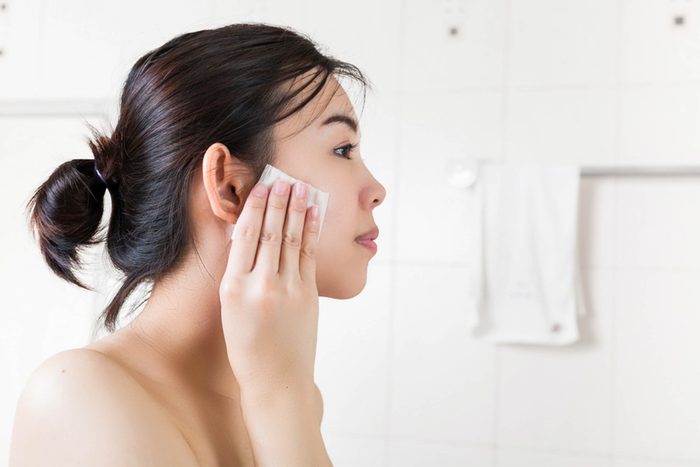
Washing your face more than once a day will lead to wrinkles
Any dermatologist will tell you the importance of washing your face twice a day—both in the morning and at night. This is true even on a lazy weekend day when you haven’t left the comfort of your own house. “The World Health Organization has determined that indoor pollution is at higher levels than outdoors,” says Miami-based dermatologist Loretta Ciraldo, MD, cofounder of Dr. Loretta Skincare. “You should wash your face twice daily and directly after exercising to clear your skin of microscopic pollutants before they penetrate and damage deeper layers of skin that can lead to age spots and wrinkles.” (Avoid these 22 habits that make you age faster.)

The higher the SPF, the better it is for your skin
Believe it or not, using a sunscreen of SPF 90 is likely no better than using one that’s SPF 50. In fact, according to Dr. Ciraldo, after SPF 45, there is little additional benefit to higher SPF numbers. “The more important factor is to apply an ample amount of SPF product to your skin,” she says. Her best advice is to apply a sunscreen of SPF 45 daily, even on cloudy days, and reapply every two hours to protect your skin from the sun’s harmful rays, which can lead to premature signs of aging.

Running or jumping will accelerate signs of aging on your face and jawline
This is nonsense. Not only is exercise incredibly beneficial for your body and overall health, but it is also great for your skin. “When we begin to exert ourselves physically, the blood vessels in our skin contract or shrink and slow the blood flow to our skin,” explains dermatologist Whitney Bowe, MD, author of The Beauty of Dirty Skin: The Surprising Science of Looking and Feeling Radiant from the Inside Out. “But as we continue to exercise and our body temperature rises, our blood vessels dilate or become wider, which increases the flow of blood to the skin.” Over the long term, this causes positive changes to the vasculature that supports the skin and keeps the skin young and healthy. (Check out these 30 anti-aging secrets that could add years to your life. )
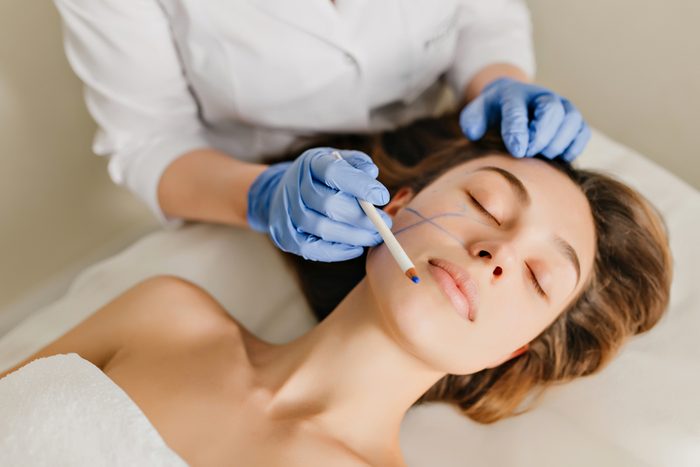
Anyone can inject Botox, not just doctors
In order to get certified in Botox injections, you have to be a physician, nurse, or other medical professional, which means that you shouldn’t have the woman who does your facials injecting anything in your face, especially Botox. “Trusting someone to inject a neurotoxin into your face and muscles is a big deal—it involves risks and side effects,” says Dr. Bowe. That’s why she recommends that you see a board-certified dermatologist who is trained in this type of work and has lots of experience.
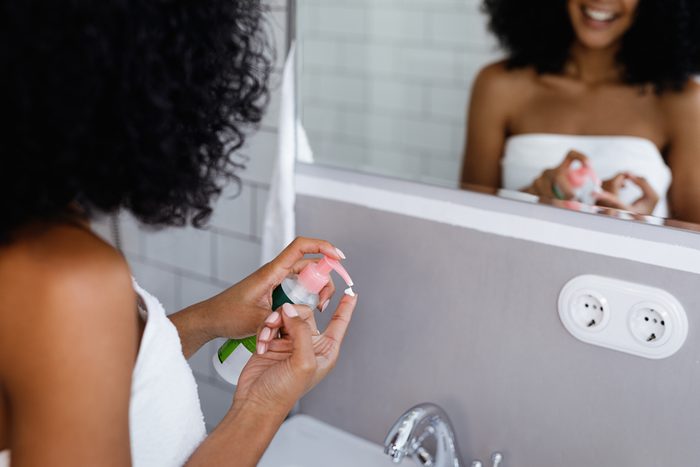
The stronger the retinol, the better
While dermatologists hail retinol as a miracle anti-wrinkle treatment, they recommend you use it with caution, since too much can cause irritation. Over-the-counter varieties can be less potent and are a great starting point for someone who has never used the vitamin A derivative. Once your skin adjusts to the concentration, you can consider speaking with your dermatologist about a prescription that contains a higher dosage. (Find out the best anti-aging products for every decade of your life.)
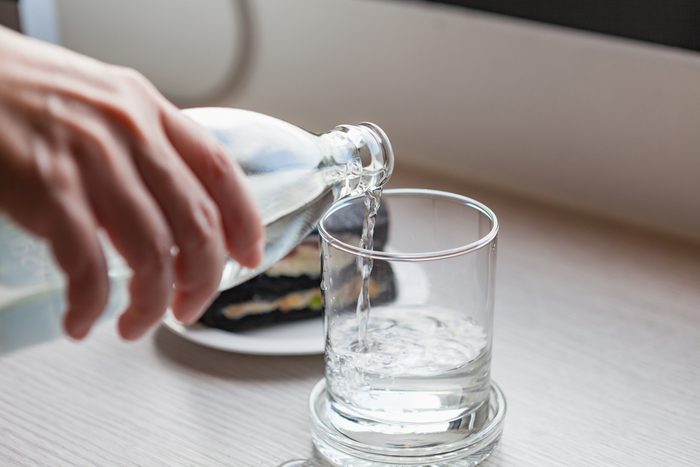
Drinking water is enough to hydrate your skin
Hydration is important for skin health, but you can’t treat dry skin by drinking water alone, according to Dr. King. “You need emollients to lock in the moisture in your skin, and we all need these more when the humidity is low and we lose more moisture from our skin into the air,” she says. “A humidifier can also be helpful, and bathe with soap substitutes like Dove Beauty Bar that won’t strip your skin of moisture.” (Avoid doing these 50 things that can make you look older.)

Don’t smile so much—it causes wrinkles
This advice is plain silly, according to Dr. Bowe, who hears this from patients all the time. “Absolutely smile, laugh, and enjoy your life,” she says. “Your skin is going to age as you age, whether you smile or not, but we have so many ways to proactively address premature aging and fine lines and wrinkles.” (Avoid these everyday habits that cause wrinkles.)
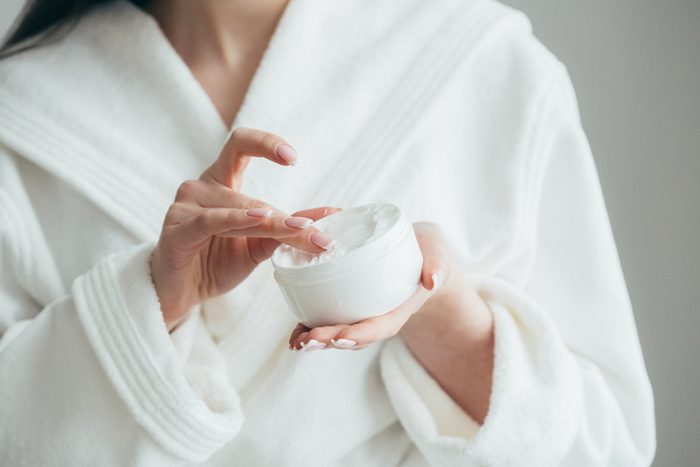
Expensive anti-aging creams can get rid of wrinkles
Believe it or not, aside from retinol, science has yet to find ingredients that can slow or reverse the aging process. “The overwhelming majority of anti-aging, firming, and anti-wrinkle creams are formulated to increase the water content of skin, thereby temporarily reducing the appearance of fine lines and wrinkles,” says Hadley King, MD, a dermatologist at Skinney Med Spa and clinical instructor of dermatology at the Weill Medical College of Cornell University. The key word is temporarily. “The most effective product you can use is sunblock.”
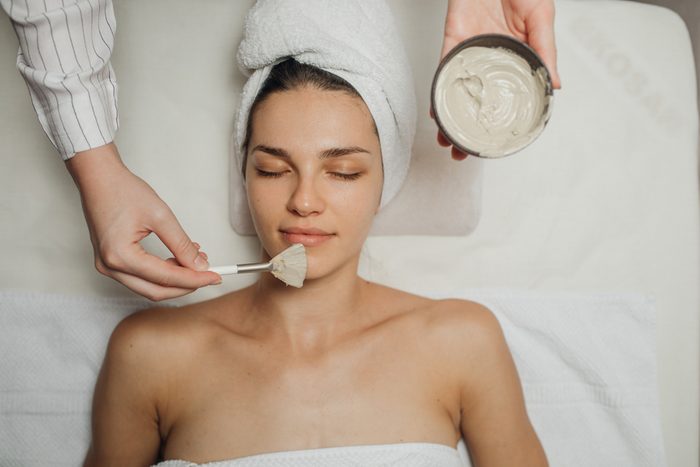
Peels make your skin thin and saggy
Chemical peels might be a little intimidating, but they most certainly do not change the thickness of your skin for more than a week or so. “Your skin is a living organism with a dermis and five layers of epidermis that are replaced every 40 days or so,” says Anna Guanche, MD, a dermatologist at Bella Skin Institute in Calabasas, California. “You may peel off the top layers of your skin and it will be thinner for a day or two, but really what happens is that your skin rejuvenates more effectively and quickly because of the peel.”
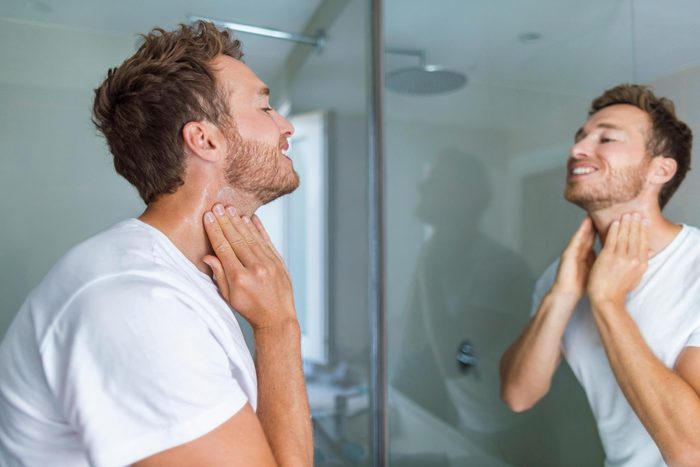
Exfoliating daily keeps skin looking youthful
Exfoliation is beneficial for your skin, but you should limit this activity to once or twice a week, no matter your age. In fact, you may even fare better by exfoliating less frequently as you age, since your skin loses oils over time. “Exfoliation daily leads to dry, cracked, and aging skin,” says Lily Talakoub, MD, a dermatologist at McLean Dermatology and Skincare Center in McLean, Virginia. “I exfoliate only once a week and in the winter once a month to keep the oils on my skin and rehydrate my skin.”
Learn other anti-aging secrets dermatologists won’t tell you for free.
